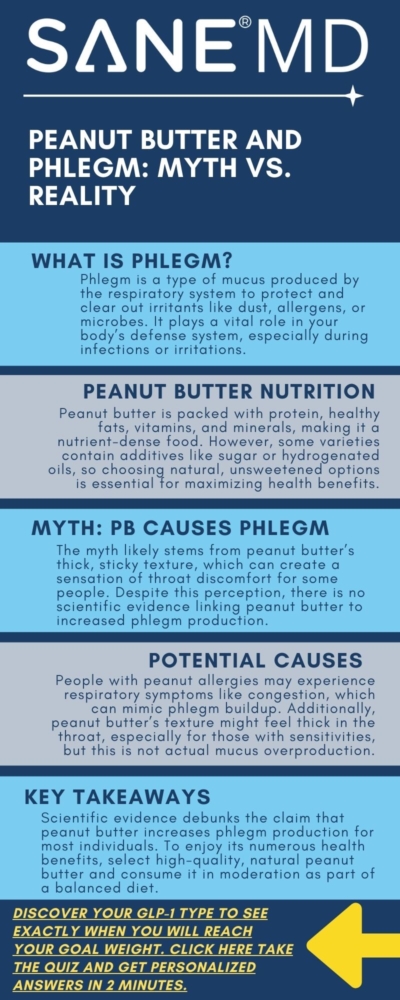Does Peanut Butter Cause Phlegm? An In-Depth Exploration
Dr. Matthew Olesiak, MD, is the Chief Medical Director at SANESolution, a renowned wellness technology company dedicated to providing evidence-based solutions for optimal living. Dr. Olesiak earned his medical degree from the prestigious Jagiellonian University Medical College in Kraków, Poland, where he developed a strong foundation in medicine.
So, does peanut butter cause phlegm? Let’s jump in and look at the facts in this throat health guide on SANE MD!
Introduction
Peanut butter, a staple in many households, is often surrounded by various health myths and questions. One such query is whether peanut butter can cause phlegm. This article jumps into the scientific aspects, nutritional content of peanut butter, and its effects on phlegm production.
Understanding Phlegm: What Is It?
Before we connect peanut butter to phlegm, it’s essential to understand what phlegm is. Phlegm is a type of mucus produced by the respiratory system, particularly when it battles infections or irritations.
Peanut Butter: A Nutritional Overview
Peanut butter is rich in protein, healthy fats, vitamins, and minerals. It’s a source of energy and contains heart-healthy compounds. However, its nutritional value can be overshadowed by additives in certain brands.
The Myth: Peanut Butter and Phlegm Connection
The myth that peanut butter causes phlegm possibly arises from its thick, sticky consistency. Some individuals report a feeling of thickness in the throat after consuming it.
Scientific Evidence: Does Peanut Butter Increase Phlegm?
There’s no substantial scientific evidence supporting the claim that peanut butter directly increases phlegm production. However, allergies to peanuts can cause symptoms like congestion, which may be confused with increased phlegm.
Peanut Allergies and Respiratory Symptoms
People with peanut allergies can experience respiratory symptoms, including increased mucus production. This is a reaction to the allergen, not the peanut butter itself.
The Role of Diet in Phlegm Production
While peanut butter isn’t a direct cause, diet plays a role in phlegm production. Foods high in refined sugars, dairy, and certain fats can impact mucus production.
How Peanut Butter Can Affect Some Individuals
For some, the texture of peanut butter can create a sensation of increased phlegm. Those with a mild sensitivity to peanuts might experience minor throat discomfort.
Health Benefits of Peanut Butter
Despite the myth, peanut butter offers various health benefits. It’s good for heart health, helps in weight management, and provides essential nutrients.
Moderation and Selection: Choosing the Right Peanut Butter
Choosing natural, unsweetened peanut butter is key. Moderation is also crucial, as excessive consumption of any food can lead to health issues.
Myths Debunked: Educating on Food Misconceptions
Educating ourselves about food myths is vital. Understanding the difference between actual health effects and perceived symptoms is essential for a balanced diet.
Conclusion
The belief that peanut butter causes phlegm is more myth than reality. While certain individuals may experience discomfort due to allergies or sensitivities, there’s no solid evidence linking peanut butter with increased phlegm production. It remains a nutritious addition to a balanced diet, offering several health benefits. Remember, choosing the right type and consuming it in moderation is the key to enjoying its advantages while avoiding potential issues.





